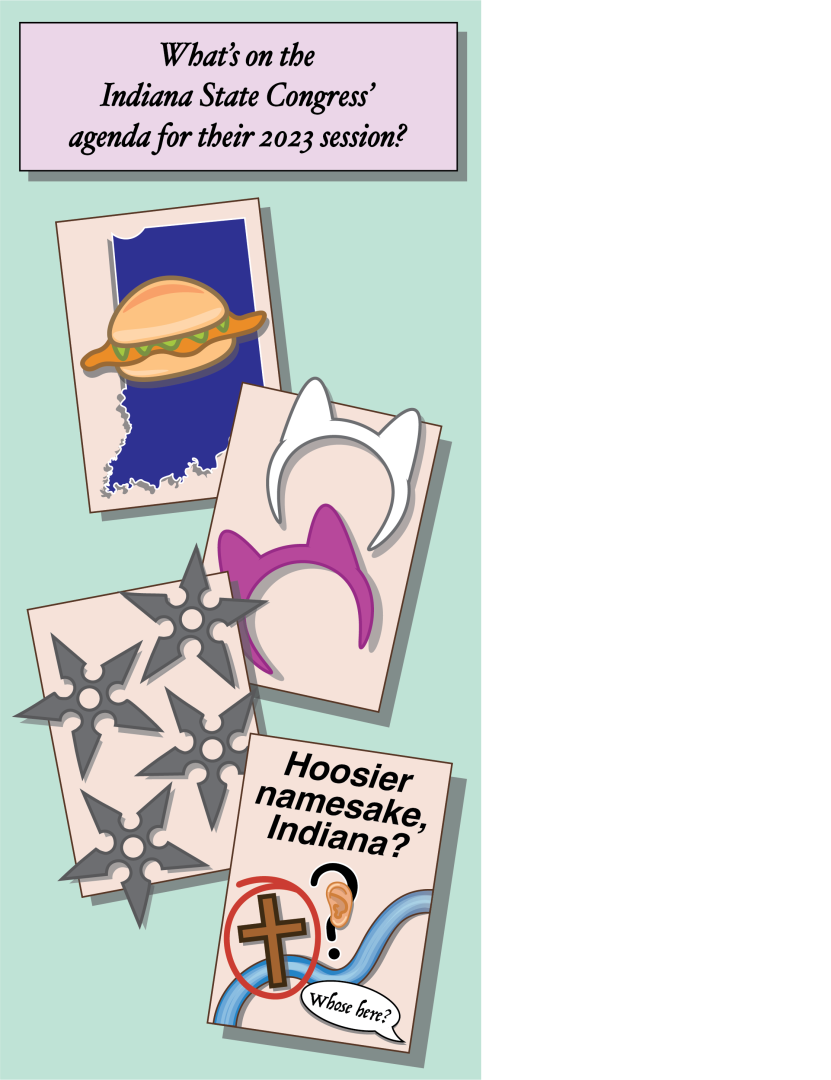Throwing stars, breaded tenderloin sandwiches, furries and the Hoosier State all have one thing in common: According to the Indianapolis Star, all of these topics are up for discussion at the 2023 Indiana Congressional Session. Bills being discussed in the state congress during this year’s session are an accumulation of more unique talking points voiced by constituents and legislators, according to the Indy Star.
Senate Bill 77 discusses the legalization of the recreational use of throwing stars on certain business premises, according to the Indiana General Assembly. According to Sen. Linda Rogers, who authored the bill with Sen. Liz Brown, it is currently illegal in the state of Indiana to possess throwing stars. Rogers said legalizing throwing stars was a concern voiced by constituents and the Indiana Public Defender Council, which is a membership consisting of all Indiana public defenders, according to the IPDC. Rogers said that the bill passed through the Senate Corrections and Criminal Law committees unanimously with one amendment that individuals ages 12 through 18 years old would be required to have parental permission before using or owning throwing stars.
“I think that the bill is fairly simple,” Rogers said. “It just provides an opportunity if an establishment wants to include that type of activity, that there are at least guidelines and a framework for them to do that.”
Bills like SB 77 are seemingly frivolous, according to University of Indianapolis Associate Professor of Political Science Laura Merrifield Wilson. SB 322, which would designate the breaded tenderloin sandwich as the state sandwich according to the IGA, reflects cultural shifts and changes that are really important, Wilson said. She said there are many states that have multiple state songs that are recognized by policy. For concerns about laws like throwing stars, there are multiple states where lawmakers went through policy changes to recognize the legalizations, according to Wilson.
“There are a lot of reasons why legislators would propose bills,” Wilson said. “So sometimes it’s to do a favor to constituencies, sometimes it’s to represent an organization that they support, and they’re doing it on behalf of an
organization. Then there are also times where they legitimately believe in the policy—and it’s not to say that they’re mutually exclusive; they could be representing constituents and believe in a policy they want to see changed.”
Nationally, the average legislator will introduce between 10 to 12 bills per session and currently the Indiana General Assembly is observing over 2,100 total, according to Wilson. Many of the bills will not make it to or pass through a committee, she said. The different ideas for policy changes and lawmaking are based on concerns of constituents and only a member of the state legislature is able to propose a bill, Wilson said.
SB 1143 designates the state nickname of Indiana to officially be “The Hoosier State,” according to the Harry Hoosier Project. The bill recognizes the legacy of Harry Hoosier—the first Black Methodist preacher in the United States, according to the Harry Hoosier Project— as the state’s namesake, according to the IGA. Bills like SB 1143 and 322 serve as a form of recognition, according to Wilson. Though it is fair to have skepticism about some of these bills, she said, the bills provide special designation to an aspect of the state that is unique and prominent to the state. Two examples are the state’s unofficial dessert, sugar cream pie, and the peony, the official state flower, she said.
“Like there’s something we see as uniquely special and a part of us,” Wilson said. “Not that other states don’t have those as part of their state flower, but it’s a representation of our culture as a state.”
SB 380 is a bill encompassing various education matters that “allows a school corporation to adopt a policy concerning dress code or distractive behavior,” according to the IGA. The bill, according to the Indy Star, is built to discourage students from behavior relating to identifying as “furries.” According to the Indy Star, the bill comes as a response to unsubstantiated claims that students are acting and dressing like animals in public classrooms. Bills like SB 77 and 380 are based on constituents’ concerns, and though the bills are minor, there are also a lot of important bills being discussed, Wilson said. People are able to advocate on behalf of something they like when it comes to bill proposals. With topics like the legalization of throwing stars or state sandwiches, time taken up to propose
and pass the bill is not necessarily taking up time over other important legislation, she said.
“If this is what gets people interested in seeing what the state legislature is doing, I think it’s great,” Wilson said. “I also hope that it’s not the only thing people believe our state legislature does because they deal with some very important and impactful issues.”







